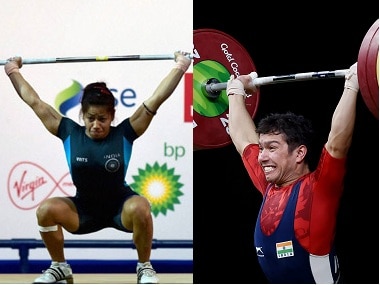
A disappointing result in the World Championships, failure to qualify for the Rio Olympics, snubbed for the Arjuna Awards, changing her weight category, an injury scare, and failure to win the national championship: The last two years have been a bumpy ride for Sanjitha Chanu. But the Manipuri weightlifter ensured that she was not weighed down by these painful memories as she raised the bar at the Commonwealth Games to win India's second gold medal.
Sanjitha had earlier won gold in the 2014 Commonwealth Games in the 48kg class, with Mirabhai Chanu finishing second. But having two lifters belonging to the same category prompted Indian coaches to coax Sanjitha to shift to the 53kg class, to help increase chances of gold medals in both categories.
The plan has clearly worked wonders with Mirabai and Sanjitha both leading India's medal charge on the weightlifting turf at Gold Coast.
Sanjitha was on cruise control mode and was assured of a gold medal even before her third and final clean and jerk lift. Having broken the Commonwealth Games record in snatch by lifting an 84kg weight, Sanjitha wanted to rewrite the clean and jerk record by going for 113kg. But she faltered. "I really wanted to create a Games record. I missed it and I am a bit sad," she said during an interaction with the media after the gold winning performance.
clean and jerk record by going for 113kg. But she faltered. "I really wanted to create a Games record. I missed it and I am a bit sad," she said during an interaction with the media after the gold winning performance.
She also revealed that she had been troubled by a bad back which forced her to cut down on the intensity of her workout in lead up to the event. "I barely trained for 15 days for this competition and I was not 100 percent fit," she said.
The Indian weightlifting team had reached Australian shores a month before the Commonwealth Games and was based in Melbourne to acclimatise with the conditions.
There was no draping herself in the tricolor after the victory, but the sigh was visible. "It was months of pressure finally coming down. I am glad I could prove those who doubted my credentials after I finished second in the Nationals," Sanjitha said.
Even during the World Championships, where Mirabai won gold, Sanjitha fell by the wayside in the 53kg class. Her sub-par total of 177 kg meant she would finish a poor 13th. Sanjitha injured herself five days before the world championship, and this caused her poor form, she believes.
Sanjitha had missed out on the 2014 Incheon Asian Games, and will be one of India's top challengers at Jakarta, a few months from now. According to experts, Sanjitha will need to raise her game by several notches if she harbours any hopes of a medal. Most of the top lifters in her category will be gunning for loads in the region of 205-210kg, more than Sanjitha's current best of 195 kg.
If Sanjitha has been one of the more recognisable faces of Indian weightlifting for the last couple of years, the performance of of young gun Deepak Lather who earned a bronze has also been a revelation.
The 18-year-old kept his tryst with history becoming the youngest Indian weightlifter to win a Commonwealth Games medal. But he has already been rewriting the record books when he became the youngest to create a national record. This he created in the 62kg category, though the Indian weightlifting think-tank convinced him to shift to the 69kg class. The reason being, armed with prodigious talent, Lather is also taller than the rest, and more muscle weight will help him garner more strength.
On Friday, while competing in the 69kg class, the boy from Haryana lifted a total of 295kg, finishing behind Gareth Evans of Wales who lifted 299kg, and Sri Lanka's Indika Dissanayake who registered 297 kg.
Lather, who was initially spotted at the Army Sports Institute in Pune, announced his arrival on the big stage when he won a bronze at the Commonwealth Championship exactly with the same effort of 295kg, which he repeated at Gold Coast.
